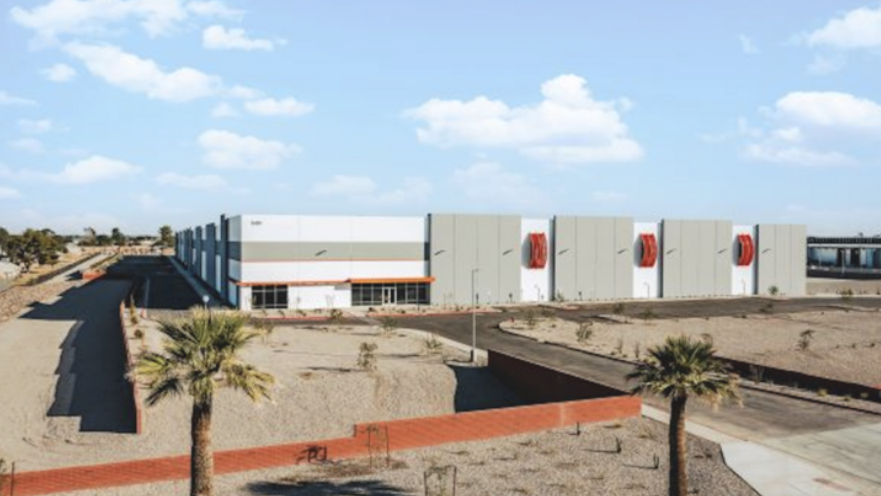Behind the deal: Why a Switzerland-based company picked West Valley for manufacturing facility, North American HQ

Global companies have been increasingly eyeing the West Valley’s industrial space in areas like the Phoenix Goodyear Airport, Interstate 10 and the Loop 303 in recent months.
One of the businesses competing for space in the past year was Switzerland-based Meyer Burger Technology AG, which recently inked a five-year lease for 100% of the new 276,000-square-foot facility at Litchfield and Lower Buckeye roads in Goodyear. The company plans to open a solar module manufacturing facility with initial production capacity of 400 megawatts. The facility also will serve as its North American headquarters.
Meyer Burger started the search for a facility in the U.S. about six months ago. The Covid-19 travel ban made the process more difficult, but Gunter Erfurt, chief executive of Meyer Burger, said one of their managing directors lives in the Phoenix area.
Arizona was one of a handful of states the company had been looking at in the South, Southwest, Midwest and East Coast, said Jackie Orcutt, senior vice president for CBRE Group Inc., who represented Meyer Burger.
“Being a European headquartered company, I think originally they thought that it would be nice to be more East Coast from a time zone standpoint,” Orcutt said. “But what ultimately drew them to Arizona was a combination of a lot of different things.”
Erfut said the criteria for a site included accessibility to a skilled and diverse workforce, customers, logistics, and consideration of natural-disaster likelihood and the business environment of the location.
“We found Arizona, specifically Goodyear, to be that exactly ideal, most balanced place in the entire country, at least where we’d been searching,” Erfut said.
A “very strong” research and development team for solar at Arizona State University that the company has a longstanding relationship with also influenced the company’s decision, Erfut said.
‘More competitive than we expected’
Orcutt said Meyer Burger initially was looking for a site based on availability of facilities and had been looking at locations across the Valley, but a requirement for a 300,000 square-foot facility “pretty much narrowed down what was going to be available,” she said.
The shortlist included Glendale, Tolleson and Goodyear. The company hoped to sign a lease for a building close to completion by the end of 2021 so they could “immediately” start their own tenant improvement process, Orcutt said.
“Thankfully, with the robust market we had in Arizona, on one hand, new construction, breaking records of how much we have under construction right now helped,” Orcutt said. “On the other hand, we’ve seen record-breaking absorption as well … it was more competitive than we expected.”
In addition to strong labor, the company needed easy access to power expansion, Orcutt said. Meyer Burger also preferred a longer, narrower building as opposed to a square box due to its assembly and product flow.
The owner of the Goodyear facility, Los-Angeles based CIM Group, preferred a shorter term lease as opposed to seven to 10 years, a trend Orcutt said she’s noticed more recently possibly due to increasing rent prices. The shorter lease could also give Meyer Burger time to establish its facility in Goodyear and have options if it outgrows the space, Orcutt said.
Incentives
Arizona’s solar industry, which ranked fifth in the nation for solar installations in 2021, was also a factor for Meyer Burger, which is working to bolster solar manufacturing in the U.S. and reduce dependency on offshore imports from places like China, one of the dominant countries in solar.
Meyer Burger plans to pursue the Foreign Trade Zone program through the city of Goodyear, Orcutt said. The city said an incentive package is still under consideration and would have to be voted on by City Council if offered.
The Arizona Commerce Authority said Meyer Burger has not received any state incentives but could be eligible for $11 million based on performance.
In January, the company was awarded $27.5 million in German government aid for sustainable cell production, about a decade after it started losing money while trying to sell solar machinery, Reuters reported. In November, the company’s corporate report showed Meyer Burger had raised more than $656 million U.S. dollars through grants, equity, debt and more from 2020 to 2021.
Plant details
Meyer Burger’s Goodyear plant is expected to produce solar modules for residential, commercial and industrial rooftop and utility-scale applications. It is projected to be fully operational by the end of 2022 with 250 initial manufacturing jobs and eventually expand to 1.5 gigawatts.
At its final stage, the facility will employ 500 working as engineering operators, maintenance and process engineering technicians, IT specialists, quality and facility managers and more. The company is currently hiring key positions that will help set up the salary system, the company said.
Meyer Burger declined to share how much it is investing in the facility, where the company plans to grow its North American headquarters, but the company said it is investing between $192 to $214 million for a gigawatt of solar cell and solar modules.
News of Meyer Burger’s plan to open its first U.S. facility came after its decision to stop making solar machinery and instead manufacture solar cells and modules, Reuters reported in May. The company also opened solar module and cell plants in Germany in 2021.
